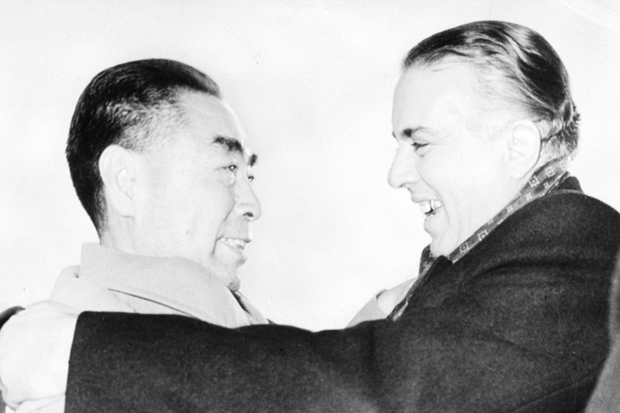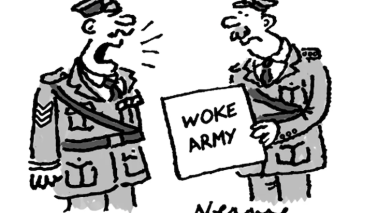In his final public appearance, the Albanian dictator Enver Hoxha addressed a Tirana crowd to commemorate the capital’s liberation from German invaders on the 28 November 1944. The Hoxha who had entered the city as a communist partisan was now a weak old man. He was often confined to a wheelchair, had to be hoisted on to his podium using a custom-built lift and was only prevented from falling by camouflaged safety rails. The dictator was deeply vulnerable but still formidably powerful.
In a characteristically rousing sign-off, lip-synced over a pre-recorded speech, he urged those gathered to
safeguard all that we have achieved like the apple of our eye and take these achievements even further, so that future generations will inherit a stronger Albania, a Red Albania, red like the eternal fire burning in partisan and communist ideals, an Albania that will live and prosper for centuries to come.
This Albania was not a real place, but Hoxha’s delusions had nothing to do with senility. As Fevziu writes,
The Albania Hoxha had promised 40 years earlier did not exist. It was never achieved. What the Albanian people were left with was best described as a nightmarish caricature of Stalin’s Soviet Union, a carbon copy of Stalinist oppression, crammed within the borders of a small country.
When Hoxha died on the 11 April 1985, Albania was the third poorest country in the world, with a per capita income of $15 per month. During his 41 years at Albania’s helm Hoxha had declared 64 per cent of the coast a military zone. Beaches were wreathed in barbed wire and land borders sealed with electric fences. Albania’s population was literally captive. Over four decades of totalitarian rule, Fevziu estimates that 5,487 were executed, 24,155 imprisoned and 70,000 displaced. Hoxha’s secret police recruited 200,000 informants. The Sigurimi held one million files detailing political sympathies and sexual preferences. The purges were comparable in severity only to Stalin’s — and inflicted upon only three million people.
Born in the southern Albanian city of Gjirokastër in 1908, Hoxha studied at the French lycée in Korçë before winning a government scholarship to the University of Montpellier. Outwardly, this bright start suggests diligence and intelligence. In reality, Hoxha won both these early benedictions, and practically every advantage there-after, through networking. When he flunked Montpellier, nepotism got him board and lodgings with a wealthy friend of a friend called Hasan Jero (whom he later sentenced to 35 years in prison).
The same sort of inflence won him a job at the Albanian embassy in Brussels, when the foreign minister to the Kingdom of Albania, Eqrem Libohova, put Hoxha forward for the position. Libohova also found Hoxha a teaching assistant position in Korçë when he returned home in 1936. It’s even arguable that networking got Hoxha the post of General Secretary of the Communist Party of Albania in 1943 — and national leadership after the German defeat in 1944.
In the postwar years, he was credited with at least some successes. His 1948 split from neighbouring Yugoslavia would later prove disastrous, but adopting Stalin’s principles of industrialisation and collectivisation improved literacy and gender equality. Yet Stalin’s death in 1953 led Albania, and Hoxha, toward political and personal isolation. Hoxha, now calling himself ‘Uncle Enver’, had adored Stalin; though Uncle Joe never reciprocated. In 1960 he denounced Khrushchev’s policies at the Communist and Workers Parties Meeting in Moscow, then fled. Time called Hoxha ‘The Red Boss’, a title he’d probably have enjoyed, and an alliance began with Mao’s China. By 1978, even this relationship had ruptured — leaving Hoxha with none of the financial resources needed to maintain his Stalinist Disneyland. The final seven years of his rule were the most painful for his people.
The man at the centre of Fevziu’s puzzle may be the most frightening despot to have escaped historical analysis up till now. Hoxha enjoyed detective stories, and specifically the work of Agatha Christie. He declared Albania the world’s first officially atheist country in 1967, but possessed a large number of theological texts. He read vampire fiction, carpeted his home using wares bought from Italian budget supermarkets and spent evenings watching the torture and murder of his opponents on video cassettes — as his daughter-in-law Liljana later revealed.
He left behind 13 volumes of memoirs, edited by his wife Nexhmije. These works still litter Tirana’s bookstalls, occasionally sell in English translation to tourists and provide a steady source of kindling. But they tell us little about who Hoxha was. As Fevziu puts it, they
portray the man that Hoxha would like to have been. He, more than anyone else, understood Wilde’s words: ‘No one is rich enough to buy back his past.’
In this admirably balanced, clearly sourced, lyrical and compassionate analysis of a tyrant, Blendi Fevziu subjects Hoxha to the scrutiny his victims never could.






Comments